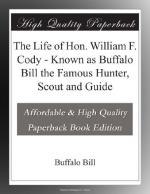Major Arms turned his command back and drove the Indians from the gun. The troops then dismounted and took position there. Quite a severe fight ensued, lasting about two hours. Five or six of the soldiers, as well as Major Arms, were wounded, and several of the horses were shot. The Indians seemed to grow thicker and thicker, as if receiving reinforcements from some large party. The colored troops, who had been bragging all the way that if they could only see some Indians “dey would blow ’em off de farm,”—which was a favorite expression of theirs,—were now singing a different tune. Every time the Indians would make a charge at us, the darkeys would cry out:
“Heah dey cum;” “Dey must be ten thousand ob ’em;” “De whole country is alive wid ’em;” “Massa Bill, does you tink we is eber agoin’ to get out o’ heah?” and many other similar expressions.
Major Arms, who was wounded and lying under the cannon—which, by the way, had become useless,—called me up and asked if I thought there was any show of getting back to the fort. I replied that there was.
Orders were accordingly given by Major Arms for a retreat, the cannon being left behind. During the movement several of our men were killed, but as night came and dense darkness prevailed, we succeeded in making good headway, and got into Fort Hays just at daylight next morning, in a very played-out condition.
During our absence the cholera had broken out at the post, and five or six men were dying daily. It was difficult to tell which was the greater danger—fighting Indians on the prairie, or facing the cholera in camp; but the former was decidedly the more inviting.
CHAPTER XIII.
A MILLIONAIRE.
Soon after returning to Fort Hays, I was sent with dispatches to Fort Harker. After delivering the messages, I visited the town of Ellsworth, about three miles west of Fort Harker, and there I met a man named William Rose, a contractor on the Kansas Pacific Railroad, who had a contract for grading near Fort Hays. He had had his stock stolen by the Indians, and had come to Ellsworth to buy more.
During the course of our conversation, Mr. Rose incidentally remarked that he had some idea of laying out a town on the west side of Big Creek, about one mile from the fort, where the railroad was to cross. He asked my opinion of the contemplated enterprise, and I told him that I thought it was “a big thing.” He then proposed taking me as a partner in the scheme, and suggested that after we got the town laid out and thrown open to the public, we should establish a store and saloon there.
Thinking it would be a grand thing to be half-owner of a town, I at once accepted his proposition. We bought a stock of such articles as are usually found in a frontier store, and transported them to the place on Big Creek, where we were to found our town. We hired a railroad engineer to survey the site and stake it off into lots; and we gave the new town the ancient and historical name of Rome. To a “starter,” we donated lots to any one who would build on them, but reserved the corner lots and others which were best located for ourselves. These reserved lots we valued at fifty dollars each.




